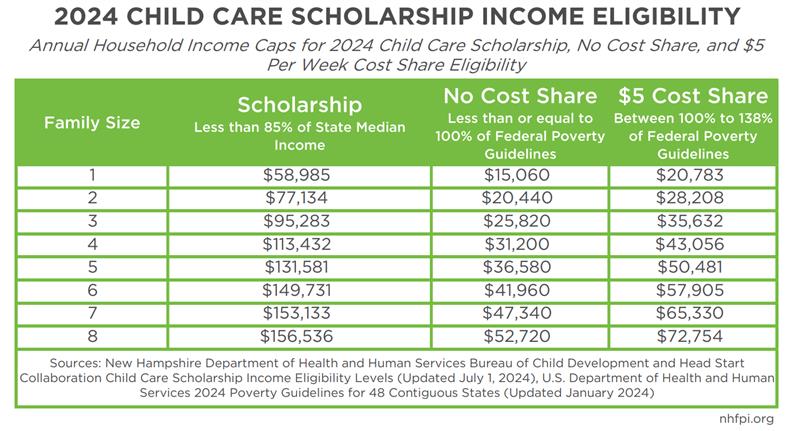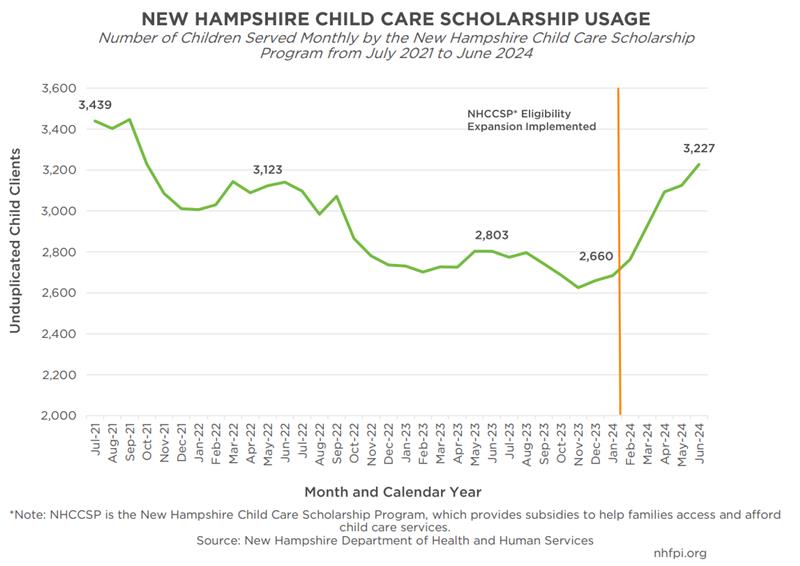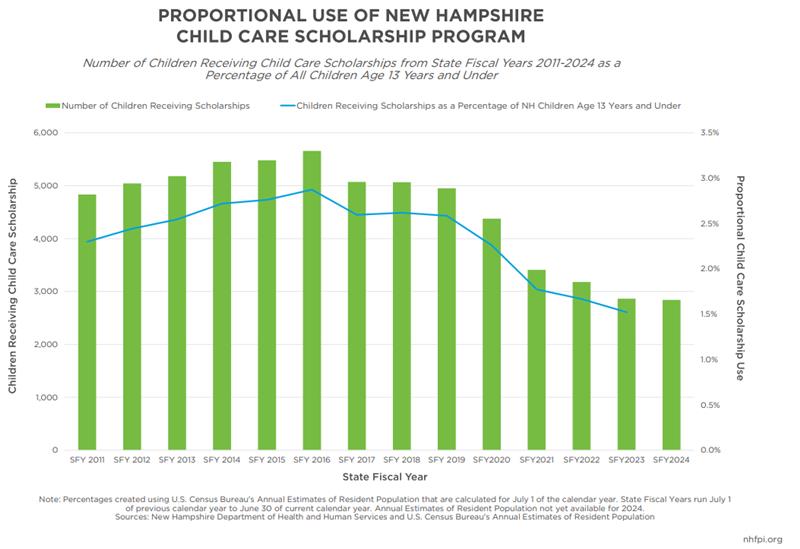For many Granite State families, child care is inaccessible and unaffordable. Some families in New Hampshire may find child care unaffordable specifically due to the high price of tuition which, in 2023, averaged nearly $32,000 annually for two children under five years old in center-based care. When parents are unable to work, family household incomes may be reduced, there are fewer individuals participating in the labor force, and the overall economy may be adversely impacted.
The New Hampshire Child Care Scholarship Program (NHCCSP), funded through a state and federal fiscal partnership, subsidizes child care tuition to make high quality early care and education affordable and accessible to families with low and moderate incomes. The program added an income eligibility expansion, which was authorized as part of the State Fiscal Years 2024-2025 State Budget and was implemented in January 2024. Since that expansion, enrollment in this state program, which served over 3,200 children as of June 2024, has increased 21 percent.
NHCCSP, Expanded Income Eligibility, and 2024 Updated Income Caps
The NHCCSP is intended to allow parents of eligible children to look for employment, attend school, participate in a mental health or substance misuse treatment program, or participate in the workforce. A child is eligible to receive the child care scholarship if they are 1) a resident of New Hampshire, 2) residing with a parent, caretaker relative, or legal guardian, 3) under thirteen years of age, or seventeen years of age if the child experiences a disability or “special need”, 4) a U.S. citizen or certain eligible non-citizen, and 5) part of a household that meets income eligibility requirements.
The SFYs 2024-2025 State Budget raised the family income eligibility cap to 85 percent of the State Median Income, reduced family cost share contributions toward child care tuition to no more than seven percent of household income for eligible families, and increased reimbursement rates for providers accepting scholarships. The State government adjusted income eligibility guidelines for the child care scholarship on July 1, 2024, coinciding with the start of State Fiscal Year 2025. The expanded income eligibility means more households should be able to participate in the program, including households of three people earning up to $95,283, or four people earning up to $113,432.
Since implementation of the scholarship income eligibility expansion in January 2024, child care scholarship usage has risen by 21.3 percent compared to enrollment in December 2023, an increase of 567 children. Year-over-year comparisons indicate a 15.1 percent increase in scholarship usage between June 2023 and June 2024. These figures reverse key recent trends, which include a reduction in scholarship enrollment of approximately 29.3 percent between July 2021 and December 2023, ranging from a peak of 3,447 children in September 2021 to a low of 2,625 children in November 2023.
As part of the 2024 legislative session, child care scholarship eligibility was also expanded to include early childhood educators who work more than 25 hours a week in a licensed or licensed-exempt child care provider that accepts scholarship as part of the Child Care Workforce Assistance Project. This legislation designates $1.1 million toward a temporary initiative that provides child care scholarships to households with at least one child care worker that earn less than 100 percent of the “…median income for the geographic area in which they reside.” The State will potentially determine specific income eligibility levels based on different household sizes. The most recently-available New Hampshire data, reflecting surveys conducted during 2022, indicate median family income for a family of three was $125,236, and $147,670 for a family of four. The initiative, which will be in effect from January 1, 2025 to June 30, 2025, may help ensure that eligible child care professionals will pay no more than seven percent of their household income toward their child care cost share.
Historical Under Enrollment and Barriers to Higher Scholarship Usage
Both the number of children in the Granite State and the number of children receiving scholarships as a percentage of all New Hampshire children ages birth to 13 has decreased over time. Proportional use of scholarships, however, should remain relatively stable given the income metrics used to set eligibility. Proportional use peaked at 2.9 percent of all children between birth and 13 years old in 2017. By 2023, using the most recently available population estimates, proportional use dropped to 1.5 percent. If proportional use remained consistent over time at 2.9 percent, there would have been approximately 5,461 children enrolled in the child care scholarship in 2023.
There are several barriers that likely contribute to under enrollment in the NHCCSP, including a lack of awareness of the program. Over half of families surveyed as part of the New Hampshire Preschool Development Grant Family Needs Assessment survey had never heard of the program. Federal funding from the American Rescue Plan Act-Discretionary appropriation to New Hampshire was designated toward developing outreach and advertising materials for the child care scholarship. These materials became available in August 2024 and could help add to the increases in enrollment that may have been previously spurred by only word-of-mouth advertising.
Additionally, not all child care providers accept child care scholarships. According to the 2024 Child Care Market Rate study, out of 733 providers identified by the State, there were 542 programs participating in the NHCCSP as of June 2024 (73.9 percent). The report, however, does not denote if all participating programs currently enroll students receiving child care scholarships. Upcoming reimbursement changes in response to the 2024 Market Rate Survey may incentivize more providers to accept scholarships. For example, reimbursement to providers for an infant enrolled full-time in center-based care receiving scholarship will be raised from $295.00 to $344.42 weekly, a monthly increase of approximately $214.
Finally, there is limited availability of child care slots due to staffing shortages in New Hampshire. Even if a family is eligible for scholarship, they may not be able to utilize their subsidy if they are unable to secure an available slot at a provider. Until the early childhood care and education workforce shortage is alleviated and providers can enroll children at their full licensed capacity, or open new businesses as needed, the current limited availability of child care slots and underutilization of child care scholarships may continue.
While a lack of affordable and accessible child care most directly impacts families, it also prevents potential workers from entering the Granite State labor force, which, as of June 2024, had only one unemployed person looking for work for every two jobs available. A well-funded early childhood care and education system benefits all Granite Staters and is a key contributing factor to a healthy, growing state economy
– Nicole Heller, Senior Policy Analyst



